Betel Leaves (Paan): Uses, Benefits, Side Effects By Dr. Smita Barode
By Dr Smita Barode +2 more

Get,

to manage your symptom
Get your,


4 Cr+ families
benefitted

OTP sent to 9988776655



You’ve successfully subscribed to receive
doctor-approved tips on
Whatsapp

Get ready to feel your best.

Hi There,
Download the PharmEasy App now!!


Register to Avail the Offer
Send OTPBy continuing, you agree with our Privacy Policy and Terms and Conditions

Hi There,
Sign up on PharmEasy now!!
Trusted by 4 crore+ families

OTP sent to 9988776655



You have unlocked 25% off on medicines




Code: NU25

Comments


Leave your comment here
By Dr Smita Barode +2 more
Table of Contents
Betel leaves are commonly used as paan (a combination of betel leaf, slaked lime, and areca nut), which acts as a mouth freshener or is sometimes consumed with tobacco. We often eat betel leaves casually, without realizing their potential benefits for our bodies.
Betel leaf, also known as paan leaf, belongs to the Piper genus, with the scientific name Piper betel. It is a heart-shaped perennial creeper found in tropical and subtropical regions such as India, Sri Lanka, Malaysia, Indonesia, the Philippines, and East Africa. Betel leaves are used both for religious purposes and for chewing.
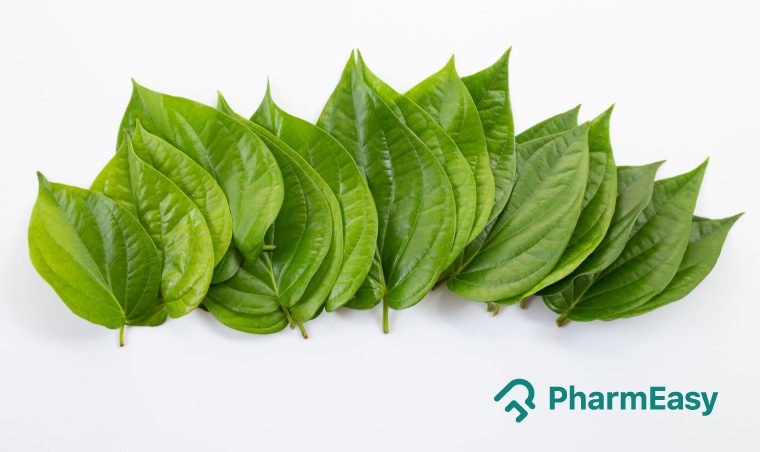
Betel vine varieties are classified into five main groups based on their morphological characteristics and the presence of essential oils1.. Betel leaves may offer several health advantages, so let’s explore betel leaf (paan) benefits.
The value of betel leaf nutrition is given below:
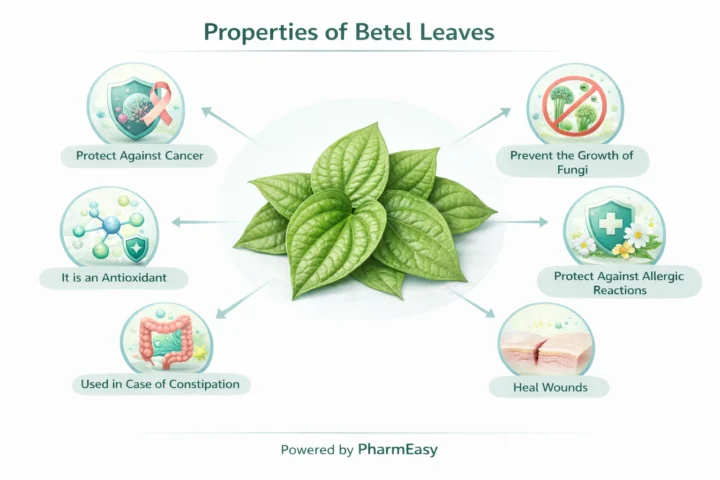
Betel Leaves may possess the following properties:
Did you know that betel leaves have played a significant role in Indian culture for centuries? Its usage dates back to 400 BC! According to ancient Ayurvedic texts like Charaka, Sushruta Samhitas, and Kashyapa Bhojanakalpa, chewing betel leaf after meals became a common practice between 75 AD and 300 AD11.
Dr. Siddharth Gupta, B.A.M.S, M.D (Ayu)
Betel leaves may have numerous health benefits, and some of the potential betel leaf uses are as follows:

Betel leaves may have cooling and analgesic (relieve pain) properties. It may be used to relieve pain from severe headaches1. Further studies on animals and humans are required to check the effect of betel leaves on headaches. If you experience a prolonged headache or unbearable pain, you must consult your doctor.

Betel leaves may have anti-cancer properties and may protect the body against cancer. Studies1 showed that phenolic-related compounds in betel leaf extract may possess the capacity to slow down the growth of cancerous cells. However, further studies are required to check the use of betel leaves on cancer. Cancer is a dangerous disease; therefore, you must get proper treatment instead of self-medicating.
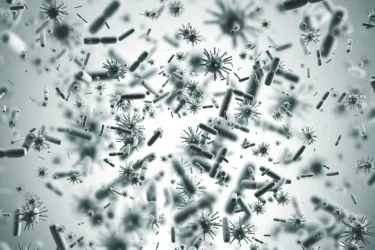
Betel leaves may help treat fungal infections as they contain a bioactive compound called hydroxychavicol (a type of polyphenol), which may slow down the growth of fungus. They are used for skin infections or as a mouthwash for oral fungal infections1. However, further evaluation of the antifungal activity of betel leaves in humans is required. If you suspect a fungal infection, you must consult your doctor and get proper treatment before the infection becomes severe.
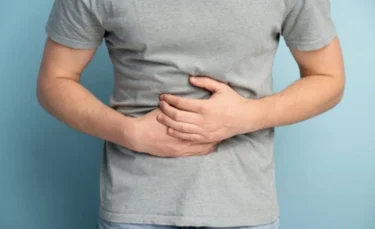
Betel leaves may help with gastric ulcers due to their protective properties. Their antioxidants may boost enzyme activity, which can be beneficial for ulcers. They may also increase mucus in the stomach lining and reduce the amount of gastric acid, helping to soothe and protect the stomach5. However, further studies on humans are required to check the activity of betel leaves for gastric ulcers. You must get proper treatment instead of self-medicating if you have painful ulcers over time.

There may be a possible betel leaf health benefit for diabetes. Studies6 on rats showed that betel leaves might decrease blood sugar levels. However, further studies are required to evaluate the activity of betel leaves for diabetes. If you are a diabetic patient, you must be diagnosed with diabetes and consult a doctor for proper treatment in case of high blood sugar levels.

Betel leaves may help with allergies. In lab studies7, they were tested on human lung cells to see their effect on substances that trigger allergic reactions. The results suggested that betel leaves may help reduce these substances, which cause allergy symptoms. However, further studies on humans are required to evaluate the action of betel leaves against allergies. If you have an allergic reaction, you must consult your doctor.
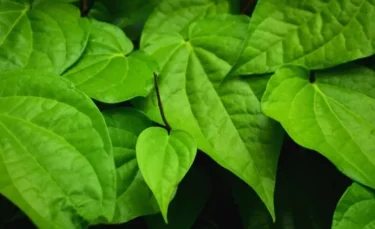
Betel leaves may have the ability to heal wounds and studies on male albino rats showed that betel leaves might reduce the healing time and increase the repair mechanism. Studies8 showed that betel leaves may help to heal wounds due to epithelialization (the process of formation of an epithelial layer over the injured surface). However, further studies are required on humans to check the ability of betel leaves on wound healing. You must immediately consult your doctor if you suffer from a severe or painful wound.
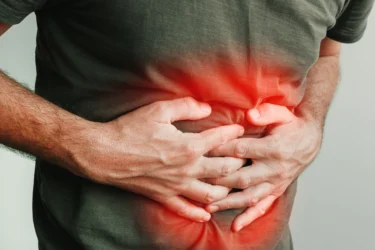
Betel leaves may be used in case of constipation. A suppository made from the stalk of betel leaves (along with castor oil) inserted into the rectum may relieve constipation9. However, further studies on humans are required to evaluate the activity of betel leaves for constipation.
Though some studies show the benefits of betel leaves in various conditions, these are insufficient, and there is a need for further studies to establish the true extent of the benefits of betel leaves on human health.
Did you know that betel leaf is often hailed as ‘Green Gold’? Globally, there are around 100 varieties of this evergreen, perennial creeper, with nearly 40 of them flourishing in India.
Dr. Rajeev Singh, BAMS
Betel leaves can be used in the following way:
Even though there are many potential benefits of betel leaf, you must consult a qualified doctor before taking betel leaves in large quantities or any herbal supplements. Likewise, do not discontinue or replace an ongoing modern medical treatment with an ayurvedic/herbal preparation without consulting a qualified doctor.
The betel plant has been traditionally used in medicine for various health concerns. It may help with conditions such as colds, coughs, bronchial asthma, and stomach pain. Additionally, it may be beneficial for issues like conjunctivitis, gum swelling, and skin boils.
Dr. Smita Barode, B.A.M.S, M.S.
Also Read: Kalmegh: Uses, Benefits, Side Effects, Precautions & More!
Betel leaves may have side effects when consumed with tobacco, lime, and areca nuts. These are considered some common betel leaf side effects:
If you experience adverse reactions to betel leaves, immediately contact a doctor or your Ayurvedic physician who has prescribed it. They will be able to guide you appropriately for your symptoms.
Also Read: Moringa Leaves – Health Benefits That You Should Know
As with any medicine, general precautions should be taken with betel leaves. Pregnant women and lactating mothers should take special care. You must consult your doctor before having betel leaves. Precaution should be taken before giving betel leaves to the elderly or children.
The uses of this plant extend beyond medicine and touch on a wide array of fascinating purposes. From being used as a possible remedy for fish poisoning and bait for fishing, to serving as an ingredient in insecticides and even finding its way into ornaments, oils, perfumes, and hallucinogens, this plant truly has a diverse range of applications.
Dr. Anuja Bodhare, B.A.M.S, M.D (Ayu)
There is not enough evidence on the interaction of betel leaves with other drugs. Further studies on the interaction of betel leaves are required. Therefore, you must consult your doctor if you are on any other medication before consuming betel leaves.
Also Read: Betel Nuts: Uses, Benefits and Side Effects By Dr. Smita Barode
Betel leaves may help in relieving headaches, fighting against cancer, healing wounds, may reduce gastric ulcers, diabetes, and allergies1.
Betel leaves may have anti-cancer, antioxidant, anti-allergic, anti-fungal, anti-diabetic, and antimicrobial properties1.
No, there are no studies that have shown the use of betel leaves for jaundice.
Betel leaves contain proteins, fats, minerals, fibre, carbohydrates, potassium, calcium, vitamin C and other nutrients2.
Yes, betel leaf is good for health. It may have anti-cancer, antioxidant, anti-allergic, antifungal, anti-diabetic, antimicrobial and anticancer properties12.
Betel leaf has been used in Ayurveda and traditional medicine for its antimicrobial, digestive, and anti-inflammatory properties. It has been applied for wound healing, cough relief, and oral health2.
Disclaimer: The information provided here is for educational/awareness purposes only and is not intended to be a substitute for medical treatment by a healthcare professional and should not be relied upon to diagnose or treat any medical condition. The reader should consult a registered medical practitioner to determine the appropriateness of the information and before consuming any medication. PharmEasy does not provide any guarantee or warranty (express or implied) regarding the accuracy, adequacy, completeness, legality, reliability or usefulness of the information; and disclaims any liability arising thereof.
Comments

Leave your comment...

View all comments(1)
You may also like
can i loose wait if i frequently eat Betel leaf?